Why Eating Meat Creates Bad Karma
KARMA
Below are some reasons why I feel that killing animals is bad for our karma. And as you are reading this, please remember the following sayings...
"You are what you eat."
"What goes around, comes around."
"Do unto others as you would have them do unto you."
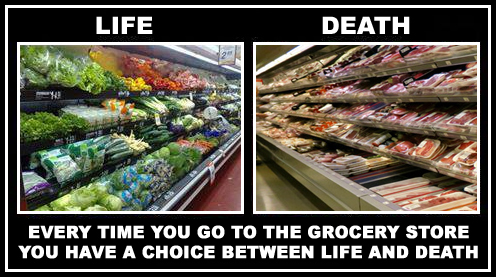
1. PREMATURE AGING AND DEATH
Below are some statistics on the natural lifespan of the farm animals we eat and how old they are when they are slaughtered...
THE NATURAL LIFESPAN OF A PIG IS 12 YEARS
* Pigs raised for ham and bacon are killed when they are only 6 months old.
THE NATURAL LIFESPAN OF A COW IS 22 YEARS
* Cows raised for milk are slaughtered when they are only 4 years old.
* Cows raised for beef are slaughtered when they are only 1 1/2 years old.
* Cows raised for veal are slaughtered when they are only 4 months old.
THE NATURAL LIFESPAN OF A CHICKEN IS 8 YEARS
* Chickens raised for their eggs are slaughtered when they are only 1 1/2 years old.
* Chickens raised for their meat are slaughtered when they are only 6 weeks old.
So in other words, most of the animals that people are eating were slaughtered when they were still practically babies.
Animals in factory farms are given growth hormones so they'll grow as fast as possible and so they'll be able to reproduce as fast as possible, and I don't think it's a coincidence that children today go through puberty several years earlier than they did before we started eating animals with all these growth hormones in them.
A lot of parents don't seem to realize that boys growing facial hair and girls growing breasts before they are even 10 years old is a form of "premature aging", and that "premature aging" could very well be followed by "premature death". (Just like the animals they ate who aged and died prematurely.)
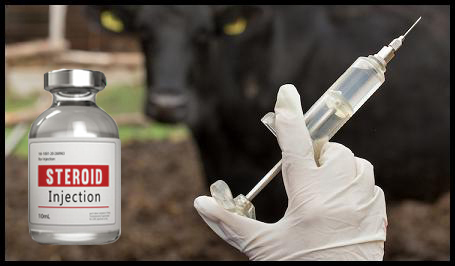
2. FAMINE AND DROUGHT
Animals being raised for food have to be given food as well, and more than half of all the grain that is grown in the U.S. is actually being fed to farm animals.
Taking an enormous amount of food each year and converting it into a much smaller amount of meat (and billions of tons of manure) has been referred to as "The most wasteful recycling program ever created by man".
Animals being raised for food also have to consume a lot of water. (Through drinking and by eating crops that require a lot of water to grow.)
While about a billion people suffer from hunger, farm animals are constantly being "fattened", and so much urine and feces is being produced in "animal agriculture" that a lot of it ends up getting washed into creeks, rivers, and oceans. (Which results in massive "dead zones" where fish and other aquatic life can no longer live and unsafe drinking water for humans.)
So if you want to do something about "global hunger" and "global thirst", please leave animals off your plate.
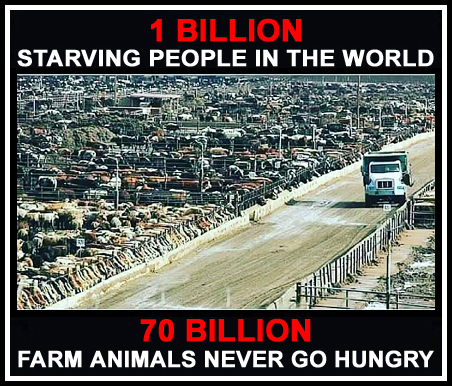
3. VIOLENCE
If the slaughter of an animal isn't quick and painless, and they experience a lot of fear and trauma right before they die, they will release a lot of adrenaline. (Which is a hormone that is often referred to as the "fight or flight" hormone.)
This hormone will remain in the meat, and some believe that when we consume meat that is saturated with adrenaline it can cause us to go into "fight or flight" mode over little things that we would normally be able to ignore. (Like a stranger accidentally bumping into us when we're walking down the street.)
Most of the animals who are killed for human consumption are killed in a "slaughterhouse", and they are already experiencing a lot of fear before they even enter the building. (They can hear the screams coming from inside, they can smell the death in the air, and they are so scared that workers will often have to use electric prods just to make them go in.)
So it's safe to say that any animal who is killed this way will be releasing a lot of adrenaline right before they die.
And keep in mind that animals aren't the only victims in slaughterhouses.
Over 100 billion animals are killed each year for human consumption, but because most people wouldn't be willing to kill an animal themself (and would rather not even think about what goes on inside a slaughterhouse) a very small percentage of the human population has to do all that killing just so everyone else can comfortably eat meat.
If you found out that the people who work at slaughterhouses loved their jobs and got a big thrill from killing the animals, would that make you feel uncomfortable? And if so, would you feel much better if you found out that the people who work at slaughterhouses hated their jobs and felt depressed about what they were doing?
The truth is that a lot of the people who work at slaughterhouses are minorities (who much like the animals, are being exploited and don't want to be there) and many of them end up with PTSD due to what they see and experience at work.
Because of all the killing that takes place in slaughterhouses, combined with the high speeds at which they have to happen just to keep up with the high demands for meat, working at a slaughterhouse is one of the most dangerous jobs in the world.
So even if you don't care about animals and you think that we should only care about people, please consider the physical and psychological harm that can and does happen to a lot of the people who have the job of "killing for a living", and consider the possibility that a lot of the violence and suffering in our society may be at least partially fueled by the fact that our society is consuming a lot of violence and suffering.
Below is a link to a documentary on YouTube called "Earthlings". This documentary shows a lot of graphic footage from slaughterhouses and other sectors of animal agriculture, so it's not for everyone. But if you doubt that there is a lot of violence and suffering in animal agriculture, please watch this by clicking the image below...

4. PLAGUES
Imagine if you were a cattle farmer and one of your cows was constantly getting sick and you were constantly having to have a veterinarian come over and give that cow antibiotics. Would you feel safe eating that cow when it finally died?
Most of the "antibiotics" that are being produced today are actually given to farm animals who are being raised for human consumption.
These days, a lot of farm animals are being raised indoors and in cramped cages, so they aren't getting any sunlight or exercise. (Which are just as essential for their health as they are for human health.) Therefore, any animals being raised this way are virtually guaranteed to get sick.
To save space, factory farms will cram their animals as closely together as possible. (Like in large chicken shacks where thousands and thousands of chickens are crammed into one building.)
In situations like this, it would be physically impossible to keep all of the animal cages clean and sanitary, so the animals end up having to stand, sit, and sleep in their urine and feces, and even people living several miles away from these places can become chronically ill from the smell in the air.
The only reason animals like these are able to live long enough to be slaughtered is because they are slaughtered at such a young age thanks to all the growth hormones they are given. (It would not be possible for an animal to live its entire life expectancy and die of "natural causes" in such unhealthy and bacteria-laden conditions.)
But the excessive use of antibiotics in factory farms can lead to the evolution of "antibiotic-resistant" bacteria. (Which means that stronger antibiotics would have to be used in the future and that stronger viruses could evolve because of it.)
And since the deadly viruses that can develop in factory farms are often "zoonotic" (meaning that they can be passed on from one species to another) if we don't stop behaving like a "virus" towards the other species on this planet, we could end up causing a virus so deadly that we can't create a strong enough antibiotic that would be safe for us to take.
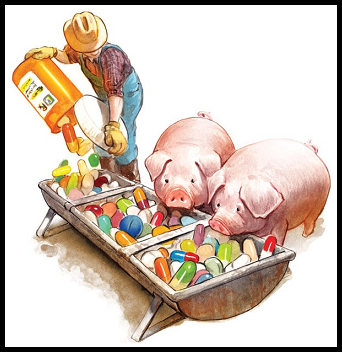
5. LOSS OF FREEDOM
Humans who are forced to spend even a small fraction of their lives in "solitary confinement" can suffer serious long-term mental health problems because of it.
Animals who are forced to spend their entire life imprisoned (even though they are 100% innocent) and who aren't even able to turn around due to how small their cages are are going to have serious mental health problems as well.
Like us, animals like cows, pigs, and chickens are social creatures, and even if they are lucky enough to be raised in groups, they will almost certainly be raised in groups of all males or all females (just like in human prisons) and many of them will go their whole life without ever even seeing the opposite sex.
Eating sick animals can result in "lockdowns" where we aren't allowed to leave our homes due to contagious viruses that were caused by eating them, and it can also result in mental health problems due to people getting a small "taste" of the isolation that the animals they eat are forced to endure.
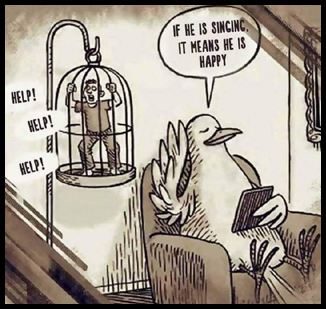
6. GOOD KARMA
Many believe that the dogs we currently have as pets were once wild wolves and that wolves became "man's best friend" because man started treating wolves as friends rather than foes.
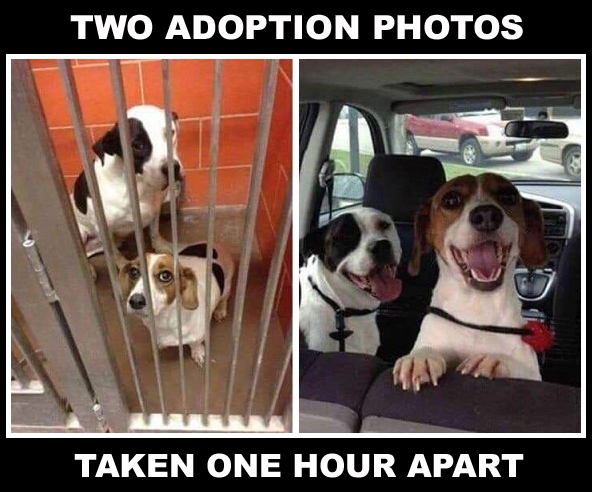
Wolves are just one of countless species on this planet, and if a karmic friendship this powerful could develop with them, imagine how many other unexpected and powerful friendships could someday develop if we started treating all animals with respect.

MORE REASONS TO BE VEGAN
HOME







